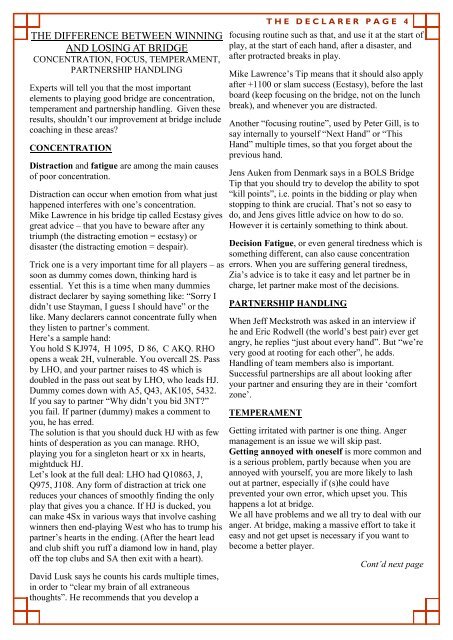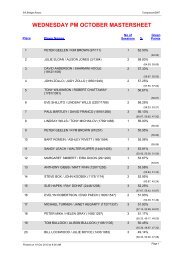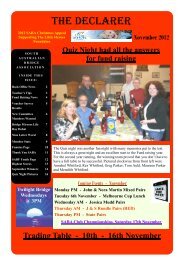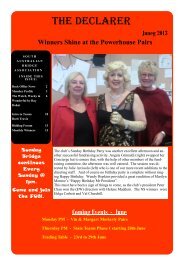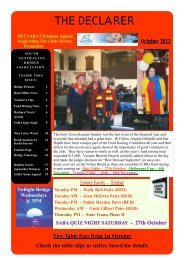THE DECLARER
May 2013 - South Australian Bridge Association
May 2013 - South Australian Bridge Association
- No tags were found...
Create successful ePaper yourself
Turn your PDF publications into a flip-book with our unique Google optimized e-Paper software.
<strong>THE</strong> DIFFERENCE BETWEEN WINNINGAND LOSING AT BRIDGECONCENTRATION, FOCUS, TEMPERAMENT,PARTNERSHIP HANDLINGExperts will tell you that the most importantelements to playing good bridge are concentration,temperament and partnership handling. Given theseresults, shouldn’t our improvement at bridge includecoaching in these areas?CONCENTRATIONDistraction and fatigue are among the main causesof poor concentration.Distraction can occur when emotion from what justhappened interferes with one’s concentration.Mike Lawrence in his bridge tip called Ecstasy givesgreat advice – that you have to beware after anytriumph (the distracting emotion = ecstasy) ordisaster (the distracting emotion = despair).Trick one is a very important time for all players – assoon as dummy comes down, thinking hard isessential. Yet this is a time when many dummiesdistract declarer by saying something like: “Sorry Ididn’t use Stayman, I guess I should have” or thelike. Many declarers cannot concentrate fully whenthey listen to partner’s comment.Here’s a sample hand:You hold S KJ974, H 1095, D 86, C AKQ. RHOopens a weak 2H, vulnerable. You overcall 2S. Passby LHO, and your partner raises to 4S which isdoubled in the pass out seat by LHO, who leads HJ.Dummy comes down with A5, Q43, AK105, 5432.If you say to partner “Why didn’t you bid 3NT?”you fail. If partner (dummy) makes a comment toyou, he has erred.The solution is that you should duck HJ with as fewhints of desperation as you can manage. RHO,playing you for a singleton heart or xx in hearts,mightduck HJ.Let’s look at the full deal: LHO had Q10863, J,Q975, J108. Any form of distraction at trick onereduces your chances of smoothly finding the onlyplay that gives you a chance. If HJ is ducked, youcan make 4Sx in various ways that involve cashingwinners then end-playing West who has to trump hispartner’s hearts in the ending. (After the heart leadand club shift you ruff a diamond low in hand, playoff the top clubs and SA then exit with a heart).David Lusk says he counts his cards multiple times,in order to “clear my brain of all extraneousthoughts”. He recommends that you develop aT H E D E C L A R E R P A G E 4focusing routine such as that, and use it at the start ofplay, at the start of each hand, after a disaster, andafter protracted breaks in play.Mike Lawrence’s Tip means that it should also applyafter +1100 or slam success (Ecstasy), before the lastboard (keep focusing on the bridge, not on the lunchbreak), and whenever you are distracted.Another “focusing routine”, used by Peter Gill, is tosay internally to yourself “Next Hand” or “ThisHand” multiple times, so that you forget about theprevious hand.Jens Auken from Denmark says in a BOLS BridgeTip that you should try to develop the ability to spot“kill points”, i.e. points in the bidding or play whenstopping to think are crucial. That’s not so easy todo, and Jens gives little advice on how to do so.However it is certainly something to think about.Decision Fatigue, or even general tiredness which issomething different, can also cause concentrationerrors. When you are suffering general tiredness,Zia’s advice is to take it easy and let partner be incharge, let partner make most of the decisions.PARTNERSHIP HANDLINGWhen Jeff Meckstroth was asked in an interview ifhe and Eric Rodwell (the world’s best pair) ever getangry, he replies “just about every hand”. But “we’revery good at rooting for each other”, he adds.Handling of team members also is important.Successful partnerships are all about looking afteryour partner and ensuring they are in their ‘comfortzone’.TEMPERAMENTGetting irritated with partner is one thing. Angermanagement is an issue we will skip past.Getting annoyed with oneself is more common andis a serious problem, partly because when you areannoyed with yourself, you are more likely to lashout at partner, especially if (s)he could haveprevented your own error, which upset you. Thishappens a lot at bridge.We all have problems and we all try to deal with ouranger. At bridge, making a massive effort to take iteasy and not get upset is necessary if you want tobecome a better player.Cont’d next page


